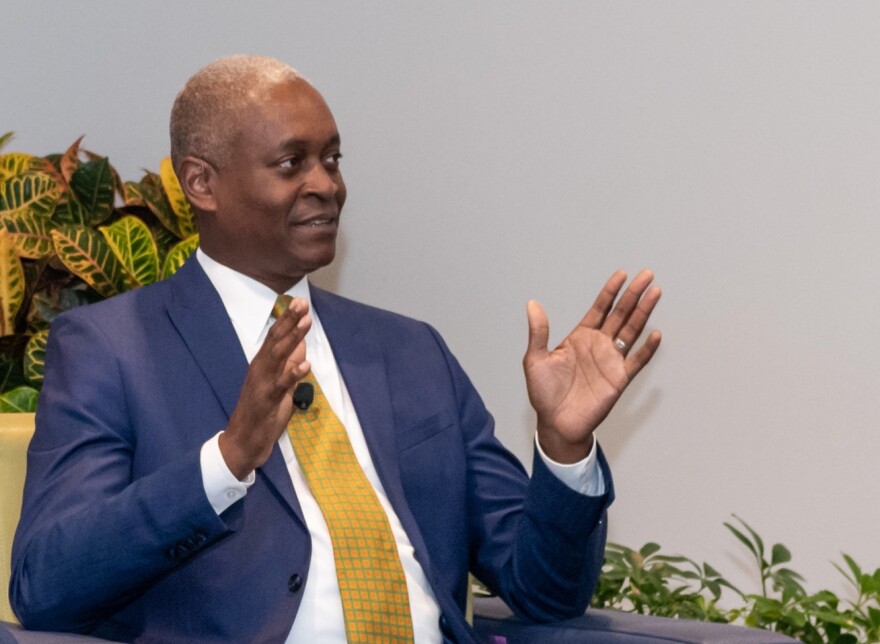The Federal Reserve leader for the region of the U.S. that includes Florida said he is ready to lower the central bank’s target interest rate as soon as later this month.
“There remains some distance between where inflation stands today and our 2% target, but the employment situation now warrants much closer scrutiny,” federal Reserve Bank of Atlanta President Raphael Bostic said in a video statement posted Wednesday.
He is a member of the Fed’s Open Market Committee, the group that decides the bank’s short-term target interest rate, which helps determine all types of borrowing rates such as car loans, home mortgages and credit cards.
Bostic said his views on the economy are similar to Fed Chairman Jerome Powell, who said last month, “The time has come for policy to adjust.”
After being late to recognize the threat, the Fed has been focused on fighting inflation for the past two and a half years. Beginning in March 2022, the Fed instituted its fastest series of interest rate hikes in its effort to cool sharply higher prices.

Consumer inflation topped out at 9% in the summer of 2022. However, it continued climbing in South Florida. Driven by the rapid rise of rent and home prices sparked by the COVID-19 pandemic migration, South Florida’s inflation rate hit almost 20% a year later.
As the Fed continued to raise interest rates for more than a year and then held rates steady for a year and counting, the national and regional inflation rates have dropped. Miami’s inflation was 5.2% in July. The national annual rate has been below 3% for the past two months.
The Fed’s target is an annual inflation rate of 2%. Even as Bostic has gotten more confident that inflation will continue to cool toward the bank’s long-term goal, he acknowledged he is “not claiming victory over inflation just yet.”
READ MORE: A late year forecast: lower interest rates — if inflation keeps cooling
Bostic’s position has its detractors.
“I simply don’t see (the need for lower rates),” said FAU Professor of Finance Rebel Cole. He worries the Fed will act prematurely with rates before inflation is fully tamed.
“Cutting rates is definitely in the best interest of the commercial real estate market and the residential real estate market,” Cole said, “but if it allows inflation to rear its ugly head again and start rising again, then [it's] all for naught.”
South Florida single family home prices have withstood higher borrowing costs. Strong demand for homes thanks to people migrating to Florida has helped. So has South Florida’s tendency to attract buyers paying cash for real estate. Those buyers are immune to changes in borrowing costs.
The median price of a single family home that has sold this year is up between 5%-8% across Miami-Dade, Broward and Palm Beach counties.
The Fed has two goals — steady prices and full employment. The agency has been shifting the tone of its messaging over the past several weeks from talking strongly against inflation to softening its rhetoric in light of some cooling in hiring.
U.S. employers have added an average of 170,000 jobs each month over the past three months. That’s down from a three-month average of 210,000 during the previous three months. In Miami, there were about 34,000 fewer people considered employed in July compared to the end of January, and about the same number of people added to the unemployment rolls.
“Though not weak, labor markets are weakening,” Bostic said in his quarterly message, “and there is a risk that this could accelerate.”
Bostic’s messaging this month echoes with what he wrote in late June when he said he intended to support lowering the rate in the fourth quarter of this year.
Overall, in his latest essay, he described the U.S. economy as “favorable.”
While the Federal Reserve is an independent agency, changes to its target interest rate during the last two months of a historically close presidential election runs the risk of sparking criticism from some people — FAU’s Cole is one of those.
“The very last thing that the Federal Open Market Committee should be doing is to take any policy action that would politicize the Fed as has happened to the Supreme Court,” Cole said. “And yet, it looks like that's exactly what they're going to do.”
Bostic tried to pre-empt critics when WLRN spoke to him in July.
"What I've heard repeatedly over my whole tenure here is that when the Fed is late on policy that has very bad downstream effects on the economy. So it's in the country's interest for us to be making decisions on time [and] in the right way. That's how I've always approached it," he said then.
Bostic and his Fed colleagues meet Sept. 17-18 to discuss and make a decision on its target borrowing rate.






